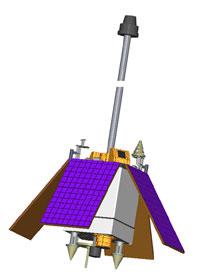Senior officials in Egypt: "The Egyptian space program will be a response to the Israeli "Horizon" program." Israel Space Association experts: "There is no doubt that the multispectral camera on the new satellite will be used by Egyptian intelligence"
 The Egyptian communication satellite also bears the name EgyptSat
The Egyptian communication satellite also bears the name EgyptSat
The Egyptian Minister of Higher Education, Hani Hilal, announced this week in Cairo that Egypt will launch the satellite in 2007
Egyptsat, the first scientific satellite to be launched by a Middle Eastern country. Israel, which is still considered the leading country in the field of space in the Middle East, has so far launched intelligence, photography and communication satellites, as well as a small technological satellite (Texat), but not a scientific research satellite like the planned Egyptian satellite. "Venus", a scientific satellite shared by Israel and France, will only be launched in 2009, two years after the Egyptian satellite.
The Egyptian satellite, built with the help of a Ukrainian company and launched from Kazakhstan, will carry an advanced multi-spectral camera and an infrared camera, both of which have intelligence-security potential. The experts of the Israel Space Association who analyzed the capabilities of the planned Egyptian satellite and its trajectory, state that "Egyptian intelligence will be able to use the satellite for its needs. The trajectory of the satellite and the nature of the cameras on it are suitable for intelligence needs."
The experts of the Space Association also emphasize that: "However, Israeli intelligence will not be able to use a similar camera that will be installed on the scientific satellite "Venus", because it is shared by France and Israel."
Senior officials in Egypt recently said that Egypt "will develop space capabilities that will respond to the Israeli Horizon satellite program." Minister Hilal also announced the development of two additional scientific satellites, Egyptsat 2 and Saharasat, which will join the Egyptian communication satellites that are currently in space, Nilesat 101 and Nilesat 102. It was also reported that on top of the same rocket that will be used to launch the Egyptian scientific satellite, 3 more will be launched Small Saudi satellites, which will be used for communication and science purposes. Israel, on the other hand, has absolutely no plans to develop additional scientific satellites beyond the French Israeli "Venus", neither independently nor in cooperation with another country.
Tal Inbar, chairman of the Israel Space Association and senior researcher at the Fisher Institute for Air and Space Research, says that "Israel is
It is still the leading country in the field of space in the Middle East, but the Arab countries and Iran are making considerable efforts to get ahead of it. Iran has already developed an advanced plasma engine for use in space and is developing an independent satellite launcher. Egypt is ahead of Israel in launching a scientific satellite, and is making massive investments in the field of civilian space, while the Israeli Space Agency's budget is tiny. To ensure Israel's continued leadership in the space race in the Middle East, the investment in the field of civilian space must be significantly increased, alongside Israel's defense space programs."

3 תגובות
What is our country called?
Oh shame
Add a nail in the coffin of Israel's scientific military superiority